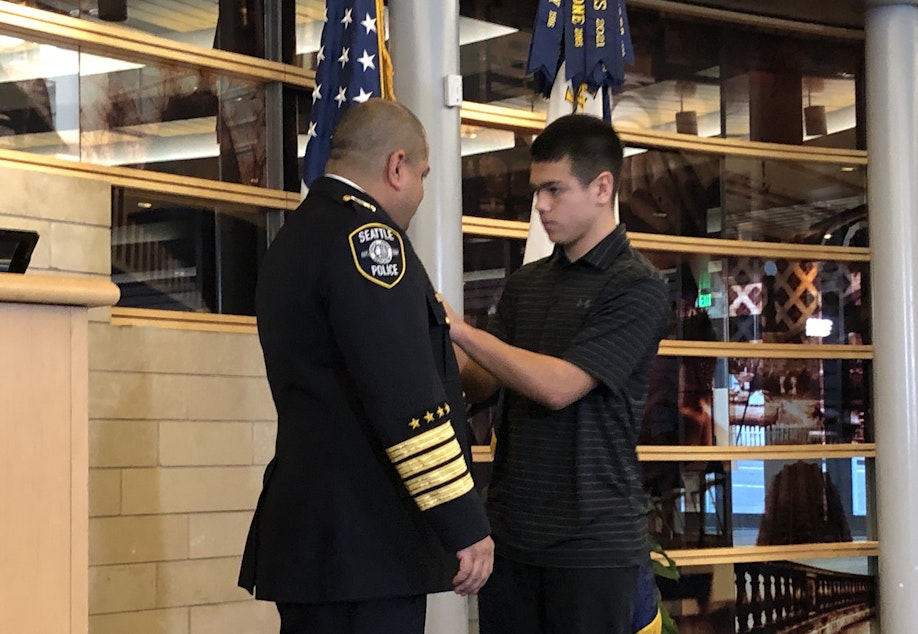At long last, Adrian Diaz sworn in as Seattle’s new police chief

After 29 months running the Seattle Police Department, Adrian Diaz said he was relieved and happy to be officially sworn in as Seattle’s next chief of police at City Hall on Thursday. His oldest son Alex pinned the badge onto his uniform as supporters applauded.
Mayor Bruce Harrell appointed Diaz as interim chief after Carmen Best’s resignation in 2020, as tensions flared in Seattle about police handling of demonstrations and the evacuation of the East Precinct.
Harrell noted that the city launched a national search to fill the job permanently.
“It says something when we hire from within,” Harrell said, noting that Diaz has been promoted up through Seattle Police ranks since joining the department in 1997.
Diaz said since he became interim Seattle Police chief, the department has made progress on priorities, including investing in officer wellness and recovering firearms used to commit crimes.
“We’ve revamped our crowd management response, including adding public outreach engagement teams, and we’re also identifying alternative responses to policing,” he said.
Sponsored
To communities that distrust or fear the police, Diaz said he’s proud that use of force by Seattle Police officers has dropped 50 percent since 2015, and complaints against officers have also seen a substantial drop.
Diaz said he’s glad to see that the city’s record-breaking violent crime statistics since 2019 are also starting to taper, including aggravated assaults, robberies, and homicides.
“August was a very, very busy month for our homicides,” he said. “We’ve actually revamped a lot of what we’re trying to do, putting officers in different places, and maybe that is hopefully seeing some of that decline. Even into the month of January.”
Harrell said he and the police chief are aligned on Seattle Police priorities.
“Chief Diaz will continue to be an instrumental partner as we move to the next phase of reform, enhance officer recruitment efforts, ensure accountability, and drive innovative efforts to develop diversified emergency responses,” he said.
Sponsored
Diaz said he’s proud of new efforts like SPD Before the Badge, a program that brings new recruits into contact with community members before they attend the police academy, and Equity, Accountability and Quality (EAQ) which Harrell’s office calls “a data-driven model of identifying and addressing disparities in enforcement.”
Said Diaz, “These are first of their kind in the nation. That’s the type of department we’re building.”
He said Seattle Police is also changing its hiring practices to bring candidates onboard in just three months.
“That is unheard of in the policing profession,” Diaz said. He said Seattle Police is committed to hiring 125 candidates this year.
Diaz said the city is also putting the mechanism in place to offer new types of crisis response when armed officers aren’t deemed necessary. He said the latest city budget contains funding for a “dual-dispatch system,” to fund creation of a system “that allows us to dispatch two different responses, not only police but also alternative responses,” which could include social workers and others, he said.
Sponsored
Diaz said Seattle Police is currently assigning additional officers to address gun violence, car theft and retail theft.
In terms of location-specific emphasis patrols, he said they are committed to maintaining existing patrols at 12th Avenue and Jackson Street in the Little Saigon neighborhood, and 3rd Avenue and Pine Street downtown.




